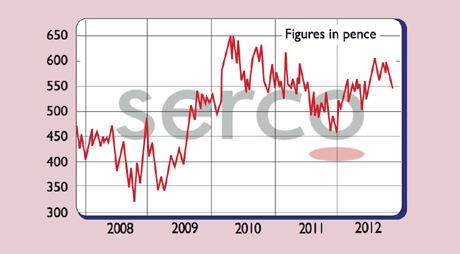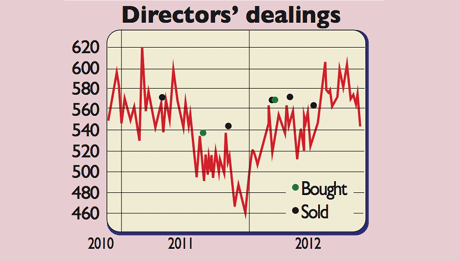Shares in focus: Is this the end for the outsourcing boom?
Serco has done extremely well out of outsourcing. But with governments reining in spending, has the sector run its course for now? Phil Oakley investigates.
Get the latest financial news, insights and expert analysis from our award-winning MoneyWeek team, to help you understand what really matters when it comes to your finances.
You are now subscribed
Your newsletter sign-up was successful
Want to add more newsletters?

Twice daily
MoneyWeek
Get the latest financial news, insights and expert analysis from our award-winning MoneyWeek team, to help you understand what really matters when it comes to your finances.

Four times a week
Look After My Bills
Sign up to our free money-saving newsletter, filled with the latest news and expert advice to help you find the best tips and deals for managing your bills. Start saving today!
Serco has done extremely well out of it, but outsourcing could have run its course for now, says Phil Oakley.
The business
Serco's main business is to provide essential services that were previously offered by governments and companies. As a result it has its fingers in many pies. Most of us will have been on the receiving end of one of its services without even realising it. It makes money by doing jobs better and cheaper than if they were provided in-house.
In Britain, Serco runs train companies such as the Docklands Light Railway (part of London's tube network), air traffic control systems, and operates speed and traffic cameras. It also runs five prisons as well as providing border control and immigration services.
MoneyWeek
Subscribe to MoneyWeek today and get your first six magazine issues absolutely FREE

Sign up to Money Morning
Don't miss the latest investment and personal finances news, market analysis, plus money-saving tips with our free twice-daily newsletter
Don't miss the latest investment and personal finances news, market analysis, plus money-saving tips with our free twice-daily newsletter
Serco also provides lots of services in the education, welfare and defence sectors. A mainstay of its services is sorting out the efficiency of business processes in private companies and local authorities.
The company has also built up sizeable businesses in the Americas, Australia and Asia. In 2011 it had sales of £4.6bn. Ninety per cent of its revenues come from central and local governments.
The history
The company can trace its roots back to 1929 when Radio Corporation of America (RCA) formed a British company to support the growing cinema industry RCA Services Limited. It wasn't until the early 1960s that it began doing the sort of work that Serco does today.
The change came about when it was awarded a maintenance contract for Britain's Ballistic Missile Early Warning System. The contract was so successful that it became the blueprint for Ministry of Defence (MOD) outsourcing contracts.
RCA continued to win contracts with the MOD and by the early 1980s had branched out into other areas, when it was awarded the role of maintaining London's traffic lights. In 1987, the company was bought by its management team and renamed Serco. It listed on the London Stock Exchange the following year.
Since then, Serco has benefited from a boom in outsourcing, particularly from governments. The British government has become a big customer as it has sought to get better value for money in public services. In recent years, the firm has also bought other businesses in order to expand into new parts of the world and different service markets.
During the last five years, Serco's profits have more than doubled, yet the performance of its shares has been fairly lacklustre, as investors have questioned its ability to keep on growing in the face of threatened public-sector cutbacks and austerity measures.
The chief executive
Christopher Hyman has held the top job at Serco since 2002. He started out as an accountant in South Africa before moving to Britain in the early 1990s to work for Ernst & Young. He moved to Serco in 1994 and became finance director of the group's European business. A decent sprinter in his youth, he is rumoured to be fiercely competitive and has raced Formula 3 motor cars in his spare time.
And unlike many chief executives, who are mainly focused on squeezing out extra profits, Hyman puts the customer above everything else. He reckons that if the company does a good job for its clients, profits will look after themselves. He took home £1.9m in 2011.
Should you buy the shares?
There are quite a few things to like about Serco. It has a very secure income stream from all its outsourcing contracts, which gives investors a degree of security at least in the short term. It is still winning new business and now has an order book of close to £20bn. Profit margins are expected to rise too. It also has a good track record of turning its profits into cash, which is always a welcome sign.
But can it keep growing? Governments on both sides of the Atlantic are already spending and borrowing too much money. This will have to be reined in sooner or later. The bull case and an argument that companies like Serco like to make is that they are part of the solution to this problem of overspending. They say that their expertise can help governments become more efficient they can spend less and yet do a better job.
This may be true, but the sheer scale of spending cuts that will be needed to put the government finances on an even keel suggests that there could be less work for outsourcing companies in the future. Serco and similar companies in the sector may find it difficult to keep making the same amount of money when existing contracts are put out to tender again. Either the amount of work involved in the contract could be reduced, or the price offered for taking on the contract could be cut, or both. We may be seeing signs of cost-cutting already as sales in Britain and America were down during the first six months of the year.
But the main problem with Serco shares, and the most important issue from an investment point of view, is that they simply aren't cheap enough to offer good value. They are trading at just over 13 times expected earnings, which does not reflect the risks of contracts being lost and the fact that there may be less work to go round in the future. The dividend yield is also too low to make the stock attractive to income-seekers. We see no reason to hold the shares.
VERDICT: AVOID
The numbers

Stockmarket code: SRP
Share price: 541p
Market cap: £2.7bn
Net assets (June 2012): £642m
Net debt (June 2012): £1,030m
P/e (current year estimate): 13.2 times
Yield (prospective): 1.7%
Interest cover: 5.3 times
What the analysts say
Buy: 9
Hold: 12
Sell: 4
Average price target: 615p
Directors' shareholdings

C Hyman (CEO): 917,024
A Jenner (FD): 364,831
A Lyons (chairman): 15,000
Get the latest financial news, insights and expert analysis from our award-winning MoneyWeek team, to help you understand what really matters when it comes to your finances.
Phil spent 13 years as an investment analyst for both stockbroking and fund management companies.
-
 Average UK house price reaches £300,000 for first time, Halifax says
Average UK house price reaches £300,000 for first time, Halifax saysWhile the average house price has topped £300k, regional disparities still remain, Halifax finds.
-
 Barings Emerging Europe trust bounces back from Russia woes
Barings Emerging Europe trust bounces back from Russia woesBarings Emerging Europe trust has added the Middle East and Africa to its mandate, delivering a strong recovery, says Max King
-
 Somero: trading this overlooked bargain
Somero: trading this overlooked bargainFeatures Mechanical-screed maker Somero dominates its niche and is attractively valued. Matthew Partridge picks the best way to trade it.
-
 How to find big profits in small companies
How to find big profits in small companiesCover Story The small- and micro-cap sectors are risky and volatile. But with careful research and patience, investors could make huge gains. Matthew Partridge explains how to find the market’s top tiddlers.
-
 The hidden gems on Aim, London's junior market
The hidden gems on Aim, London's junior marketFeatures Aim, London’s junior market, is risky – but you can find solid stocks at low prices. Scott Longley reports.
-
Three Aim-listed firms that will thrive in a post-Brexit world
Opinion Matt Tonge and Victoria Stevens of the Liontrust UK Smaller Companies Fund pick three Aim-listed firms that will survive Brexit turmoil.
-
Fetch! The Chinese small-cap stocks to buy in the Year of the Dog
Opinion Each week, a professional investor tells us where she’d put her money. This week: Tiffany Hsiao of Matthews Asia selects three Chinese small-cap stocks with exciting potential.
-
Small and mid-cap stocks with big potential
Opinion Professional investor Guy Anderson of the Mercantile Investment Trust selects three small and medium-sized firms with promising prospects that the market has missed.
-
 Get cheap, reliable growth from smaller companies
Get cheap, reliable growth from smaller companiesFeatures One of the most reliable long-term investment trends is the long-term outperformance of smaller companies over blue chips. Max King picks some of the best ways to buy into this growth.
-
 Now the bitcoin bubble’s burst, what’s the next big thing?
Now the bitcoin bubble’s burst, what’s the next big thing?Features Forget bitcoin, if you want to increase your wealth faster than most other people, you need to find the next big thing. Merryn Somerset Webb suggests some places to look.